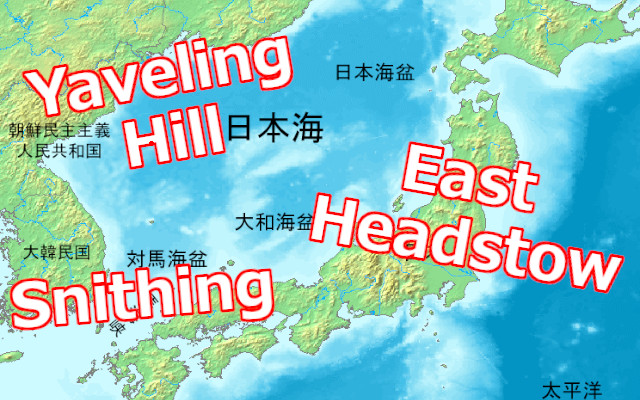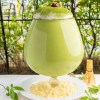
Yeetstead is quite beautiful this time of year.
We’ve seen before the crazy things that can happen when Japan gives kanji-names to foreign countries or when foreigners give kanji-names to themselves.
But what about the reverse? What if someone took the kanji-names of the 47 Japanese prefectures and turned them into English instead?
That’s exactly what Reddit user topherette did, compiling a map of Japan with Anglicized versions of the names of the prefectures, islands, and some cities as well.
And when we say there’s a lot more going on here, we mean it. The map’s creator topherette put a ton of research and careful thought into each of the names. Let’s take a look at a few examples:
- Aomori (青森) turns into Greenwood, which is pretty straightforward. One of the meanings of “ao” is “green” and “mori” means “woods/forest.” Simple enough.
- Niigata (新潟) turns into Newpool, which is great. “Nii” means “new” and “gata” means “lagoon,” so “pool” is a great choice, making it sound like Liverpool.
- Tokyo (東京) turns into East Headstow, which is an absolute delight. “To” meaning “east” is pretty simple, but “kyo” means “capital,” though the author wasn’t satisfied with just that. To make it really feel English, they opted for Anglo-Saxon words whenever possible, in this case “heáfod-stów” (meaning “capital”).
Those are cool but mostly self-explanatory. Let’s take a look at a few more advanced ones:
- Akita (秋田) turning into Sadfield might not make sense right away if you can read Japanese. Doesn’t “aki” mean “autumn?” Shouldn’t it be “Autumn Field?” The answer is that the “Aki” in Akita used to be written with a different kanji, in this case 飽 meaning “bored/tired/sad.” No wonder the people living there changed the name!
- Shizuoka (静岡) turning into Netherhill might also be confusing, since “shizu” means “quiet.” Shouldn’t it be “Silent Hill?” But again the answer is that Shizuoka used to be written differently, using 賤 meaning “despite/poverty/low.” The word “nether” is a great word to combine them together, reminiscent of “nether regions.” Again, a solid name change.
- Fukui (福井) turning into Yeetwell is both hilarious and awesome. Similar to the last two, the “fuku” in modern-day “Fukui” means “fortune/happiness,” but it used to be written with 脹 meaning “bulge/swell.” The author used the Old English word “geotan” meaning “to pour/gush” which evolved linguistically into “yeet.” And “i” just means “well/water hole.”
And then there’s the names of Japan’s four islands themselves!
- Honshu (本州 meaning “main province”) becoming Mainland makes sense.
- Kyushu (九州 meaning “nine provinces”) as Nineshire is absolutely adorable.
- Shikoku (四国 meaning “four countries”) as Fourland sounds like the setting for an English fairytale.
- Hokkaido (北海道 meaning “northern sea road”) as North Key Way has one of the most interesting reasons behind it. While “north” and “way” are direct translations, the middle “kai” didn’t originally actually mean “sea,” it was the word that the native Ainu people used for the land. The Japanese people simply used “sea” because it was pronounced “kai” too and thus “Hokkaido” was born. Here, similarly, the author has chosen an English word (“key”) similar to the original Ainu (“kai”).
- Oh, and don’t forget that Japan (日本 meaning “sun origin”) is now Sunwell too!
Of course as topherette admitted, this kind of thing is not an exact science, and many locations have different competing etymologies. But it’s still a lot of fun to look at, and be sure to check out the original Reddit thread for some more detailed explanations, as well as the rest of the Toponomy subreddit for more cool “translated” maps.
And if you want to take a look at some great, professional examples of translating Japanese names to English, see what you think of the top 5 best Pokémon name translations too.
Source: Reddit/topherette
Top image: Wikimedia Commons/DEMIS World Map Server, Artanisen (Edited by SoraNews24)
Insert image: Reddit/topherette
● Want to hear about SoraNews24’s latest articles as soon as they’re published? Follow us on Facebook and Twitter!

 “We wasted so much time in English class” — Japanese Twitter user points out major teaching flaw
“We wasted so much time in English class” — Japanese Twitter user points out major teaching flaw Tokyo popup shop sells Japanese indigenous Ainu-inspired tableware for limited time
Tokyo popup shop sells Japanese indigenous Ainu-inspired tableware for limited time River in Japan’s Nara Prefecture suddenly turns fluorescent green【Videos】
River in Japan’s Nara Prefecture suddenly turns fluorescent green【Videos】 Japan would like to remind you that “emoji” has nothing to do with “emotion”
Japan would like to remind you that “emoji” has nothing to do with “emotion” How the meaning of “quality” differs between the U.S., Japan, Korea, and China
How the meaning of “quality” differs between the U.S., Japan, Korea, and China Foreigner’s request for help in Tokyo makes us sad for the state of society
Foreigner’s request for help in Tokyo makes us sad for the state of society Starbucks Japan adds a Motto Frappuccino to the menu for a limited time
Starbucks Japan adds a Motto Frappuccino to the menu for a limited time Anime girl English teacher Ellen-sensei becomes VTuber/VVTUber and NFT
Anime girl English teacher Ellen-sensei becomes VTuber/VVTUber and NFT Tokyo Tsukiji fish market site to be redeveloped with 50,000-seat stadium, hotel, shopping center
Tokyo Tsukiji fish market site to be redeveloped with 50,000-seat stadium, hotel, shopping center Red light district sushi restaurant in Tokyo shows us just how wrong we were about it
Red light district sushi restaurant in Tokyo shows us just how wrong we were about it Sandwiches fit for a sumo served up in Osaka【Taste Test】
Sandwiches fit for a sumo served up in Osaka【Taste Test】 McDonald’s new Happy Meals offer up cute and practical Sanrio lifestyle goods
McDonald’s new Happy Meals offer up cute and practical Sanrio lifestyle goods Akihabara pop-up shop sells goods made by Japanese prison inmates
Akihabara pop-up shop sells goods made by Japanese prison inmates Beautiful Ghibli sealing wax kits let you create accessories and elegant letter decorations【Pics】
Beautiful Ghibli sealing wax kits let you create accessories and elegant letter decorations【Pics】 Japan’s massive matcha parfait weighs 6 kilos, contains hidden surprises for anyone who eats it
Japan’s massive matcha parfait weighs 6 kilos, contains hidden surprises for anyone who eats it Japanese ramen restaurants under pressure from new yen banknotes
Japanese ramen restaurants under pressure from new yen banknotes All-you-can-drink Starbucks and amazing views part of Tokyo’s new 170 meter-high sky lounge
All-you-can-drink Starbucks and amazing views part of Tokyo’s new 170 meter-high sky lounge French Fries Bread in Tokyo’s Shibuya becomes a hit on social media
French Fries Bread in Tokyo’s Shibuya becomes a hit on social media Studio Ghibli releases new action figures featuring Nausicaä of the Valley of the Wind characters
Studio Ghibli releases new action figures featuring Nausicaä of the Valley of the Wind characters New private rooms on Tokaido Shinkansen change the way we travel from Tokyo to Kyoto
New private rooms on Tokaido Shinkansen change the way we travel from Tokyo to Kyoto Studio Ghibli glasses cases let anime characters keep an eye on your spectacles
Studio Ghibli glasses cases let anime characters keep an eye on your spectacles Studio Ghibli releases Kiki’s Delivery Service chocolate cake pouches in Japan
Studio Ghibli releases Kiki’s Delivery Service chocolate cake pouches in Japan New definition of “Japanese whiskey” goes into effect to prevent fakes from fooling overseas buyers
New definition of “Japanese whiskey” goes into effect to prevent fakes from fooling overseas buyers Our Japanese reporter visits Costco in the U.S., finds super American and very Japanese things
Our Japanese reporter visits Costco in the U.S., finds super American and very Japanese things Studio Ghibli unveils Mother’s Day gift set that captures the love in My Neighbour Totoro
Studio Ghibli unveils Mother’s Day gift set that captures the love in My Neighbour Totoro New Japanese KitKat flavour stars Sanrio characters, including Hello Kitty
New Japanese KitKat flavour stars Sanrio characters, including Hello Kitty More foreign tourists than ever before in history visited Japan last month
More foreign tourists than ever before in history visited Japan last month New Pokémon cakes let you eat your way through Pikachu and all the Eevee evolutions
New Pokémon cakes let you eat your way through Pikachu and all the Eevee evolutions Sales of Japan’s most convenient train ticket/shopping payment cards suspended indefinitely
Sales of Japan’s most convenient train ticket/shopping payment cards suspended indefinitely Sold-out Studio Ghibli desktop humidifiers are back so Totoro can help you through the dry season
Sold-out Studio Ghibli desktop humidifiers are back so Totoro can help you through the dry season Japanese government to make first change to romanization spelling rules since the 1950s
Japanese government to make first change to romanization spelling rules since the 1950s Ghibli founders Toshio Suzuki and Hayao Miyazaki contribute to Japanese whisky Totoro label design
Ghibli founders Toshio Suzuki and Hayao Miyazaki contribute to Japanese whisky Totoro label design Doraemon found buried at sea as scene from 1993 anime becomes real life【Photos】
Doraemon found buried at sea as scene from 1993 anime becomes real life【Photos】 Tokyo’s most famous Starbucks is closed
Tokyo’s most famous Starbucks is closed One Piece characters’ nationalities revealed, but fans have mixed opinions
One Piece characters’ nationalities revealed, but fans have mixed opinions We asked a Uniqlo employee what four things we should buy and their suggestions didn’t disappoint
We asked a Uniqlo employee what four things we should buy and their suggestions didn’t disappoint Princesses, fruits, and blacksmiths: Study reveals the 30 most unusual family names in Japan
Princesses, fruits, and blacksmiths: Study reveals the 30 most unusual family names in Japan 43-year-old bosozoku biker arrested for never growing out of his teenage riding style
43-year-old bosozoku biker arrested for never growing out of his teenage riding style Japanese prime minister accidentally asked about government’s massive “Robbery Campaign” budget
Japanese prime minister accidentally asked about government’s massive “Robbery Campaign” budget The science behind why English speakers can’t pronounce the Japanese “fu”
The science behind why English speakers can’t pronounce the Japanese “fu” 11 different ways to say “father” in Japanese
11 different ways to say “father” in Japanese What’s wrong with English education in Japan? Pull up a chair…
What’s wrong with English education in Japan? Pull up a chair… Everyday Japanese names that make English speakers chuckle
Everyday Japanese names that make English speakers chuckle “How do you google using Yahoo?” and other amazing questions from Japan’s Yahoo! Answers
“How do you google using Yahoo?” and other amazing questions from Japan’s Yahoo! Answers Japanese student protesters announce “WE WILL STOP!!!!” in English on Twitter, get clowned for it
Japanese student protesters announce “WE WILL STOP!!!!” in English on Twitter, get clowned for it Dark Horizon textbooks go beyond “Hello my name is…” to “Who are you calling a bitch, bitch!”
Dark Horizon textbooks go beyond “Hello my name is…” to “Who are you calling a bitch, bitch!” Five words that sound completely different across Japanese regional dialects
Five words that sound completely different across Japanese regional dialects How safe is Japan? New interactive map reveals reports of crime around the country
How safe is Japan? New interactive map reveals reports of crime around the country RocketNews24’s six top tips for learning Japanese
RocketNews24’s six top tips for learning Japanese Work-in-progress Japanese AI program could probably get into 474 universities in the country
Work-in-progress Japanese AI program could probably get into 474 universities in the country Keeping up with the kids: Japanese high schoolers’ most popular slang of Spring 2022
Keeping up with the kids: Japanese high schoolers’ most popular slang of Spring 2022 English conversation school in Japan has clever reminder that students don’t have to be perfect
English conversation school in Japan has clever reminder that students don’t have to be perfect The hidden meaning of the U.S. Air Force’s “shake and fries” patch in Japan
The hidden meaning of the U.S. Air Force’s “shake and fries” patch in Japan Wakayama’s “Umi no Sachi” train line adds a colorful splash to the start of summer
Wakayama’s “Umi no Sachi” train line adds a colorful splash to the start of summer
Leave a Reply